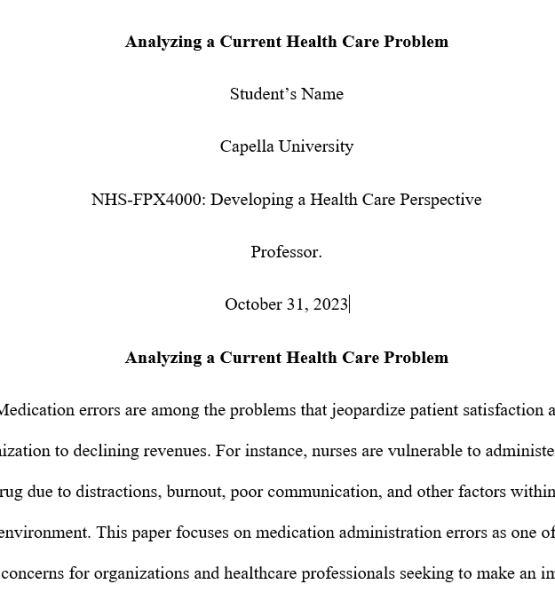
Analyzing a Current Health Care Problem
Student’s Name
Capella University
NHS-FPX4000: Developing a Health Care Perspective
Professor.
October 31, 2023
Availability:In Stock
Medication errors are among the problems that jeopardize patient satisfaction and expose an organization to declining revenues. For instance, nurses are vulnerable to administering the wrong drug due to distractions, burnout, poor communication, and other factors within the clinical environment. This paper focuses on medication administration errors as one of the primary concerns for organizations and healthcare professionals seeking to make an impact in a complex healthcare sector.
Wrong drug administration is among the primary challenges for patients, healthcare professionals, and organizations. The errors cause adverse drug reactions associated with severe complications, deaths, and additional costs for a hospital, patients, and families. Readmissions and prolonged hospitalization are other undesirable outcomes associated with wrong drug administration (Al Khreem & Al-khadher, 2021). High-risk drugs expose patients to serious consequences, hence the need for increased vigilance, accountability, and responsibility when handling patients with complex medication requirements. Manias et al. (2020) reminded healthcare professionals to acknowledge the preventable nature of medication errors and help their organizations identify and intercept risks across the continuum.
The authors indicate that complete adherence to the rights of medications including, timing, dosage, route, drug, and patient enables nurses and physicians to enhance the quality and safety of patient care. Awareness about the procedures, standards, and practices for administering medications safely makes it easier for the care team to handle patients with serious conditions, including the elderly with multiple challenges and in need of high-risk drugs.
The issue in this assessment is wrong drug administration triggered by administrative, human, and technical weaknesses. A nurse may administer a fatal dose of the wrong medication, despite the existence of clear warnings before administering the drug. Investigations could reveal other serious mistakes such as distractions by a personal conversation while drawing the drug from a cabinet, failure to check with the hospital’s pharmacy, and ignoring warnings and pop-ups about the selected medication (Kelman & Tamburin, 2019). Additionally, a nurse may administer drugs in powder instead of the recommended liquid form. A scenario revealing the wrong drug administration showed that a nurse injected a drug despite a clear warning on the bottle cap indicating that the chosen medication was a paralyzing agent. Thus, a nurse is likely to face charges of reckless homicide by making mistakes that cause a patient’s death. Nurses should remain vigilant and adhere to medication administration procedures associated with powerful medications.
Wrong drug administration reveals administrative, technical, and human-related gaps. One intervention is adequate training to remind nurses, physicians, and pharmacists about the value of increased vigilance and adherence to the rights of medication administration across the care continuum. The sessions make the team aware of the need to consult when handling high-risk drugs (Al Khreem & Al-khadher, 2021). The second consideration is the need for nurses to avoid unrelated conversations and distractions when processing and administering medications.
Nurses should only focus on what they are doing when they are working with drugs to avoid instances where they fail to identify the correct medication or ignore clear instructions. A barcode scanning system is also appropriate in such cases to enable nurses to identify an error before it causes harm (Manias et al., 2020). The absence of the tool makes patients vulnerable to wrong identification, hence likely to receive the wrong drug or dosage. Adopting a barcode medication administration makes the nursing team responsive to technological transformations meant to enhance the accuracy and adequacy of medication and patient details. The organization benefits from a tech-savvy workforce with positive attitudes and behavior toward changes that help streamline medication administration.
Reviews
There are no reviews yet.